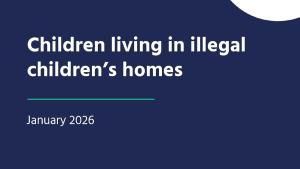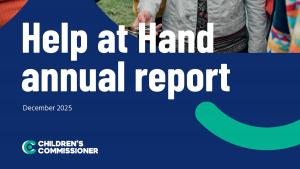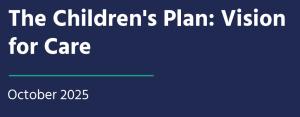It is often said that the best judgement of a civilised society comes by looking at how it treats its most vulnerable citizens.
If that is the case – and as Children’s Commissioner it is a guiding principle – then this report offers a stark warning to society.
Time and time again, we see cases of children who have been abused, exploited or even groomed by adults being subjected to discrimination and punishment – often, to a far greater extent than any adult perpetrator.
These children are stigmatised, ostracised, sidelined. Their voices are deemed unimportant; often, shamefully, because they come from some of the most challenging and most troubled backgrounds. They are considered ‘hard cases’.
Too often, they have been in care. Nearly half (49%) of children in care who are ever given a caution or criminal conviction came into contact with the justice system after they went into care, not before. Their experience of the criminal justice system can be unsettling, often exacerbating existing trauma or anxiety by being contained in settings that are unsafe, where educational opportunities are limited, and where reports of sexual abuse by staff are not uncommon.[i]
In other words, instead of care and support to overcome entrenched difficulties (children who come into contact with the justice system disproportionately come from poverty, or have special educational needs),[ii] our response to these children is one of retribution, up to and including a criminal record.
As Children’s Commissioner, a question that guides me every day is “would this be good enough for my child – or for yours?” If the answer is no, then we must step up and do better.
For these children, those in the care of the state – our children, our responsibility – that answer is too often no. Standards are woefully poor, expectations even more so.
My advocacy team Help at Hand is at the frontline of cases like the ones documented in this report. Children with complex needs or disabilities whose behaviours require significant care from expert professionals, are criminalised for lashing out and damaging property. My case workers tell me time and time again about instances of children’s homes calling the police because a child breaks something.
Of those children who had their first contact with the justice system only after entering care, they are more likely than other children ever found guilty to be initially charged with assault or criminal damage under the value of £5,000.
For any other child, these would not be ‘incidents’ documented in writing. There would be no report, no police involvement. They would usually be handled by parents or other caregivers in private, where children are allowed to be children.
Earlier this week I had the privilege of delivering this year’s Longford lecture, on the subject of prison reform – specifically, on how to prioritise rehabilitation for the young people who end up in the criminal justice system, to create a system that supports them back into society.
During this lecture, I told the story of a young girl whose story I recently because aware of.
Her early life was beset by some of the most fundamental challenges that a young life can face. Eventually, her complicated needs and behaviours – the consequences of early trauma – led to her family urgent requesting help caring for her. They wanted to do more for her – but their pleas for support were ignored.
During one night of crisis, while in acute distress her behaviour became unmanageable. With no other help forthcoming, her parents called the police for assistance and support to get her the care she needed.
Instead, the police arrested her and remanded her into custody.
Instead of a child making a mistake, she became a criminal.
Instead of help and support, society offered its harshest judgement.
Now she is ‘in the system’, stuck in a cycle of unmet needs, fear leading to violence, with little stability away from her family.
And she is not alone. It can be seen in how society treats many children like her, with complicated and difficult backgrounds – especially young girls. I see it in the treatment of the victims of grooming gangs in Rotherham, and other areas, where as a country, we turn a blind eye to abuse and violence against them by dangerous, predatory men.
This report does not specifically address the way these girls were exploited, nor the multiple ways children like them are criminalised – but their stories highlight the consequences of not treating children as children. Their stories represent a much wider problem: when it comes to children in care, whose short lives have been shaped by the kind of trauma and abuse most of us cannot even imagine, we take away their innocence. We allow the national conversation to be dragged away from themes of corruption and abuses of power by adults, towards discussion of children’s behaviours, placing adult responsibilities and choices on them despite their ages and vulnerabilities.
They were children. That is all that should matter. It should be the single most important thing when deciding how to respond.
Instead, we allow their voices to go unheard time and time again, and their experiences swept under the carpet – because they are ‘hard cases’.
Supporting them to achieve, even thrive, will require a far more ambitious approach to public services than has ever been achieved, one where children’s services are no longer the junior partner but equal partners with schools, health services and youth justice settings. Where investment is focused on creating safer, familial homes for children, not ones that perpetuate fear and violence. Where children’s voices and views are at the heart of reform, with their wellbeing and security prioritised by professionals.
If we are judged by how we treat our most vulnerable people, there can be no ‘hard cases’. Every child deserves equal chance of a childhood full of opportunity. Our ambition for these children – our children – must be limitless.
[i] Children in custody 2024–25, HM Inspectorate of Prisons, 2025. Link.
[ii] The educational journeys of children in secure settings, Children’s Commissioner, 2025. Link.





